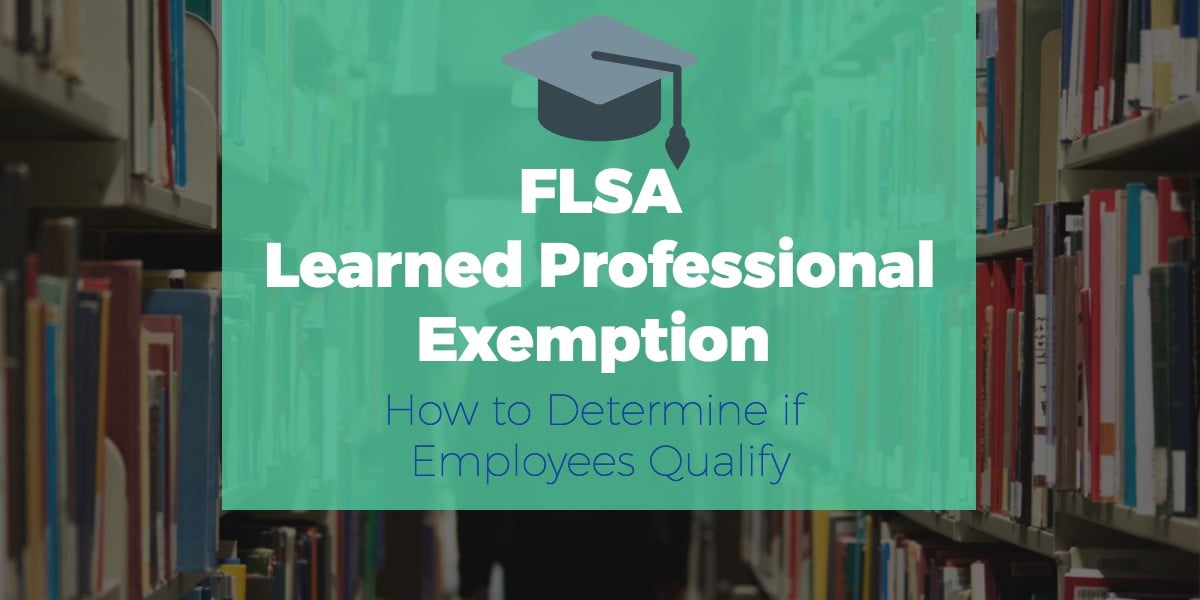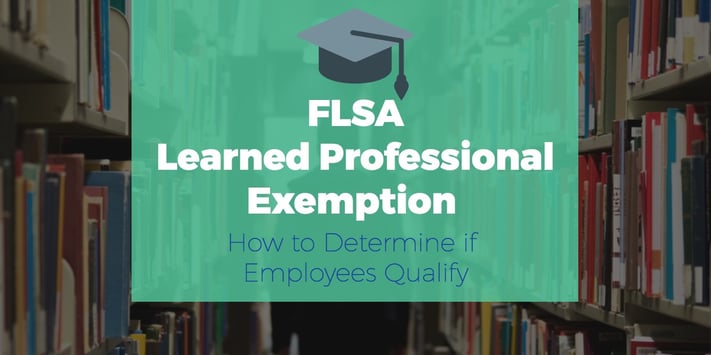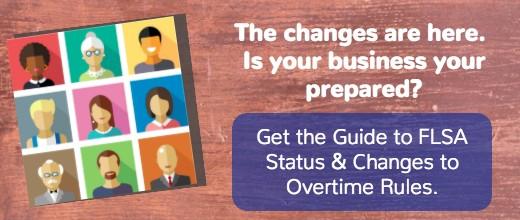Update: As of July 1, 2024 changes have been implemented to the Fair Labor Standards Act. For most up to date information, visit the Department of Labor website or schedule a consultation with Fuse.
Since it was first enacted in 1938, the Fair Labor Standards Act (FLSA) has set the federal standard for working hours and pay. The Department of Labor (DOL) enforces the FLSA’s stringent guidelines for determining employee eligibility for overtime pay, and it is critical that you are familiar with the recent changes to some of these guidelines.
Most recently, in Jan. 2020, the DOL increased the salary level for determining overtime eligibility from $455 per week to $684 per week ($35,568 per year), making more than 1.3 million people now eligible for overtime pay. But salary isn’t the only factor that determines employee exemption from overtime. You also need to consider each employee’s job duties and whether any of the following FLSA exemptions apply: learned professional exemption, executive exemption, administrative exemption, outside sales exemption, and computer exemption.
This post covers the learned professional exemption under the FLSA and how you can apply it in your workforce. But first, it is a good idea to review the foundational concepts of FLSA status and what it means to be exempt or nonexempt.
How to Classify Employees as FLSA Exempt or Nonexempt
An employee with nonexempt status is covered under the entitlements of the FLSA, including the right to overtime pay and minimum wage. Conversely, an employee classified as FLSA exempt is not covered by the FLSA, and therefore is not entitled to overtime pay or minimum wage.
An employee’s FLSA status is determined by three factors: salary basis, salary level, and duties performed. An employee is considered FLSA exempt if all three of the following exemptions are true:
- The employee is compensated on a salary basis (not hourly).
- The employee earns at least $43,888 per year (or $844 per week).
- The employee performs exempt job duties.
If any of the above exemptions do not apply to an employee, the employee is considered nonexempt. However, it is not always that straightforward. Although salary basis and salary level are easy to determine, the job duties exemption requires more consideration to decide if an employee’s position is truly FLSA exempt.
What Is the Learned Professional Exemption?
A learned professional exemption is possible when an employee is paid on a salary basis, earns above the FLSA exemption threshold weekly or annually, and performs job duties that fall into the three following categories:
- The position requires advanced knowledge: The employee performs primarily intellectual work, and uses their advanced knowledge to analyze and make decisions about data, facts, and observations.
- The position is in a field of science or learning: The individual is in a field such as medicine, engineering, teaching, accounting, or other areas outside of the mechanical and skilled trades.
- The position requires expertise acquired by a prolonged, specialized instruction: The employee requires specialized academic training to enter the profession.
If all of the above conditions apply, an employee is considered to have “passed the test” for the FLSA learned professional exemption.
One allowable exception to the job duties requirements above applies to “highly compensated workers.” Employees who meet the following criteria established by the DOL are classified as FLSA exempt:
- Perform office or non-manual work
- Receive total annual compensation of $132,964 or more (which must include at least $844 per week paid on a salary or fee basis)
- Perform at least one of the duties of an exempt executive, administrative, or professional employee
It is critical to note that a learned professional exemption is often not possible for individuals who have solely obtained a high school diploma. Similarly, an employee who has acquired knowledge from a prolonged course of specialized instruction—such as a college degree—does not automatically qualify for the learned professional exemption. The employee must also use the acquired advanced knowledge to perform the main duties of the job. Moreover, like all other FLSA exemptions, a learned professional exemption cannot be determined based on an employee’s title.
Real-World Examples of the FLSA Learned Professional Exemption
Common examples of roles typically eligible for the learned professional exemption include doctors, lawyers, certified public accountants, and teachers. However, the learned professional exemption can also apply to other roles. For example, in 2020, the DOL issued an opinion letter and concluded that part-time management training professionals did perform learned professional duties, but they did not meet the other criteria for FLSA exemption because of their salary basis and level.
Other roles that meet the learned professional exemption often include:
- Accredited healthcare professionals, such as physician assistants and registered nurses
- Executive chefs with specialized academic degrees
- Certified athletic trainers
- Licensed funeral directors and embalmers
Classifying your employees based on the learned professional exemption requires careful consideration, especially for positions in the same or similar job function. Consider the following examples in nursing, accounting, and engineering:
Nursing
A registered nurse (RN) licensed by the state examining board who is paid $920 per week on a salary basis and a licensed practical nurse (LPN) who earns $15 per hour cannot be classified the same way for several reasons.
First, the RN is paid on a salary basis above the exemption threshold, but the LPN is not. Second, the RN performs job duties that require advanced knowledge and discretion in the field of science.
Lastly, the RN has acquired advanced knowledge through a prolonged course of specialized intellectual instruction. Conversely, although the LPN works in the field of science, the position does not require advanced knowledge and education. Based on these factors, the RN receives a learned professional exemption. The LPN is not exempt and is eligible for overtime pay and a minimum wage.
Accounting
Similar to the different kinds of nurses, it is necessary to distinguish between a certified public accountant (CPA) and a bookkeeper. Although both work in the accounting field and have education beyond high school, there are some noteworthy differences between the two roles.
The CPA is a certified professional with advanced accounting knowledge who possesses the necessary qualifications to make financial determinations for an organization. Though the bookkeeper may have specialized accounting skills—such as working with generally accepted accounting principles (GAAP) and using accounting systems—they didn’t necessarily need a prolonged course of specialized instruction like the CPA. Therefore, the CPA is considered a learned professional, and the bookkeeper is not.
Engineering
Another occupation in which it can be challenging to classify employees is engineering. Although it may seem that all engineers would be considered learned professionals, some engineering-related jobs do not require advanced knowledge or a degree, but rather the specialized knowledge of a skilled technician.
In the past, courts have ruled that some engineering roles are nonexempt because they are not dependent upon advanced education and training. For example, a certified engineer meets the learned professional exemption, but a design specialist working in an engineering firm may not.
Classify Your Employees with Confidence
Determining your employees’ FLSA status requires careful consideration, but it doesn’t have to leave you wondering if you made the right decision. For step-by-step guidance on how to classify your employees and ensure compliant overtime management, get the Guide to FLSA Status and Changes to Overtime Rules today.
Originally published November 8, 2016 updated July 15, 2021.


